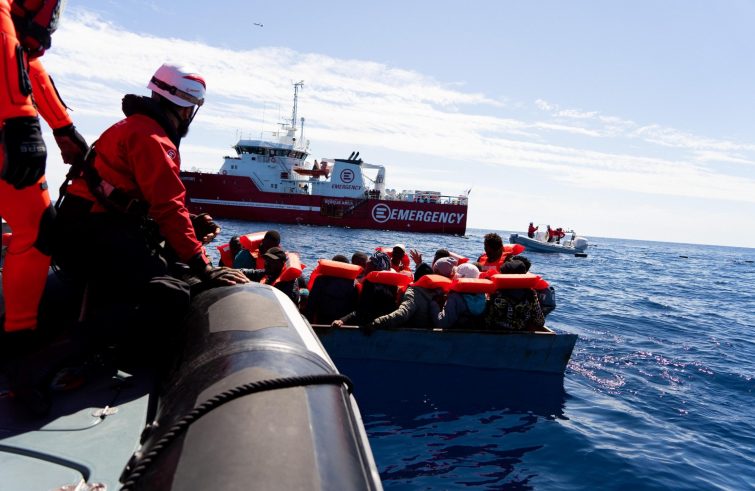
The number of people forced to flee their homes surpassed 100 million this year for the first time, but only a small fraction sought a better life in Europe. A total of 105,129 migrants arrived in Italy by sea, including 13,386 unaccompanied minors. At the end of the year, 107,677 migrants were included in the reception network. An additional 170,000 arrived from Ukraine, only 20% of whom were hosted in reception facilities; the majority were taken in by family members and fellow nationals. However, the positive experience of the Ukrainian refugees – who benefited from temporary protection, financial support and the possibility of entering the labour market immediately – has not been replicated for all the other refugees arriving via the Mediterranean or the Balkan route: Afghans, Syrians, Somalis, Nigerians, also fleeing armed conflicts.
“Taking in refugees in a humane manner is possible”, but it is “a lesson that Italy refuses to learn”:
“It failed to capitalise on the Ukrainian experience and to move beyond the emergency rationale.” In fact, “there appeared to be two parallel paths: one for the Ukrainians and one for everyone else, while in actual fact these are people facing the same plight” – reads the 2023 Annual Report released by the Jesuit Refugee Service in Italy ‘Centro Astalli’, presented today in Rome, in the presence of Cardinal Matteo Maria Zuppi, Archbishop of Bologna and President of the Italian Bishops’ Conference.
“The first steps of the new government, after yet another tug-of-war that took place while the refugees were on the vessels awaiting a safe port,” says Centro Astalli,
were focused on a renewed effort against the NGOs involved in rescue at sea.
Nor did the victims of the shipwreck in Cutro give rise to humane responses from political leaders, despite the fact that civil society had vigorously requested a different course of action.”
As many as 18,000 persons benefited from the 8 organisations that form part of the Centro Astalli network in 2022, 10,000 of them in Rome. There were over 700 volunteer workers, with 46,313 distributed meals, and meetings with a total of 27,855 students in the framework of educational projects on the right to asylum and inter-religious dialogue, carried out in 18 Italian cities.
Centro Astalli runs special Reception Centres (in Trento, Vicenza, Padua) as well as centres under the Reception and Integration Service – SAI (in Bologna, Palermo, Rome, Trento), which housed a total of only 33,848 persons at the end of 2022. The report suggests that the SAI network should be “extended and invested in, in order to guarantee effective integration support for all, in accordance with national standards.” Many religious congregations in Rome, Trento, Vicenza and Padua have opened their doors to accommodate the refugees.
On a total of 1,308 people taken in by the Centro Astalli network, 240 refugees were integrated into community-based semi-independent programmes in cooperation with religious congregations,
where co-housing arrangements involving university students from refugee backgrounds and Italian university students were successfully implemented.
The vulnerability of refugees is growing. The Report shows an increase in the physical and psychological vulnerability of refugees, caused by violence and torture in their countries of origin and transit (Libya and the Balkans): 50% of the persons accommodated in the Centro Astalli centres in Rome suffer from these conditions. Many residents have serious pathologies. For this reason, the Jesuit service calls for “new ways of reception and care that will envisage customised programmes and time frames, including specialised professional staff.”
Housing emergency and cost of living. As for the weaker segments of the population, resettled refugees find it hard to obtain affordable housing and pay utility bills due to the rising cost of living. “Refugees with stable job contracts and advanced integration processes face the lack of affordable housing, unless they turn to straitjacket contracts, illegal lodgings, sublets or makeshift solutions.” From Trento to Catania, from Bologna to Palermo, the cry of alarm is the same:
“Refugees in Italy still have no right to housing”,
underlines the report. Families and unaccompanied women with children (one third of the refugees assisted by the social accompaniment service in Rome) have suffered the most from the negative impact of the economic crisis, as have refugees applying for family reunification: “At the end of long and costly procedures, the reunited families are left alone to face a new situation, with available tools.”
Italian bureaucracy and digital divide. In order to access international protection and integration paths, migrants and asylum seekers in Italy face considerable obstacles and bureaucratic hurdles. A third of the Centro Astalli’s users of low-threshold services fall into the “pending residence permit” category. In 2022, thanks to the support of the Apostolic Almsgiving Office, Centro Astalli allocated funds to pay the fees related to the issuance of residence permits and travel documents for 586 identified refugees. Those who lost their jobs also faced difficulties in obtaining a valid residence address – a precondition for social entitlements and integration pathways. Moreover,
the digitalisation of numerous public and private service platforms is causing a digital divide that risks increasing social inequalities and marginalisation.
Centro Astalli noted that the voluntary sector cannot coordinate social inclusion and job integration processes alone: what is needed is “a governmental regulatory body tasked with developing accessible and practical solutions.” Even the National Integration Plan drawn up by the Asylum and Immigration Panel last year, “to date, has been to no avail.”












